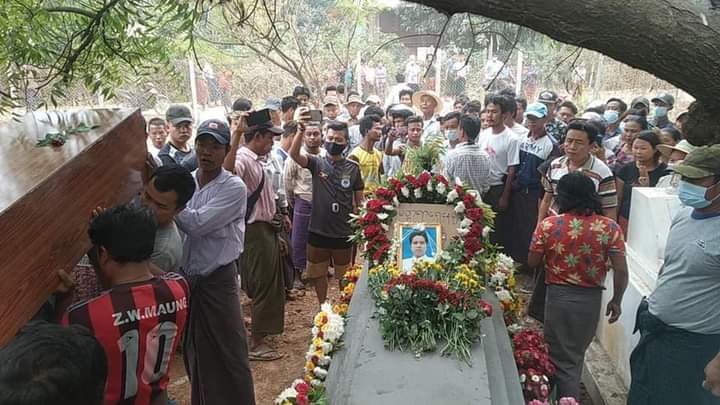Tin Nwe Win, a mother of two young girls, is anxious for her husband who has now been bedridden for several days. He has a problem with his lungs, she says, and is showing signs of tuberculosis.
Although she can send her husband for a medical check-up in a private hospital in downtown Mandalay—just 38 km from Bo Kone village in Madaya township where the couple live—she is reluctant to do so, not even daring to make the short trip to downtown Madaya to buy medicines after security was tightened at the now notorious Mandalay-Myitkyina Highway checkpoint.
“This morning, I was stopped and checked by security forces at the gate for 15 minutes. Soldiers forced me to show my shopping card, my COVID-19 vaccination certificates, and even told me that I must bring my motorcycle registration when I next cross into the town,” she told DVB.
Like her, scores of people riding motorcycles, bicycles, and private vehicles had been stopped by soldiers; a long tailback had formed by the checkpoint where each was being interrogated: “Where are you travelling from? What are your reasons for visiting the town?”
Lying along the Mandalay-Myitkyina highway—a key strategic route to Khin-U, Shwebo, and other Sagaing Region flashpoints—Madaya is an example of where protests have given way to guerrilla operations as the military looks to encircle populations living within the new northwestern theatre of war.
Maw Maw, a young woman who commutes daily from Kyauktada village to Madaya Myoma market, said that, yesterday morning, soldiers guarding the checkpoint verbally abused as she was travelling to work at a beauty salon.
“From now on, I have to prepare all these nonsense documents and hope that it’s enough to let me safely travel to the next village to work.”
According to several local sources, security at the checkpoint—located between Madaya town and Kan Phyu village—was tightened after a time-bomb exploded there on Friday, killing three soldiers. Later, two unexploded devices were found amongst the sandbags used to barricade the position.
Before the blast, locals say that only 20 soldiers had camped Madaya, making a base in the town’s USDP offices. Now, the military has used the bombing to lead a crackdown on the township, bolstering personnel numbers at strategic locations and launching a series of new raids.
Following Friday’s explosion, soldiers forcibly entered the home of a young man who had previously been charged under Section 505(a). Unable to find him, troops ransacked the house, stealing a computer, two phones, and K5 lakh (US$275) in cash; whilst also kidnapping the man’s father and uncle.
On Saturday morning, the dead body of the man’s 33-year-old uncle was returned to the family. His father remains under military interrogation. Locals told us that neither man had participated in protests since the coup.
The death means that eight civilians have now officially been killed by soldiers in Madaya since February. The actual number is likely far higher; on March 27, mass protests led to the military opening fire on crowds marching in the town, causing the deaths of at least ten people on the short stretch of road running between the township’s administrator office and Madaya Myoma Primary School alone, locals told DVB.
Also on the night of the check-point bombing, a married couple—both CDM teachers—received a visit from security forces. Sources told how the pair were beaten during their arrest and snatched from their home before being able to make arrangements for their seven-year-old son, who was left behind.
According to a DVB report, there are more than 2,300 education staff in Madaya, of which over 1,200 are partaking in the CDM. Eight have so far been arrested by the military, yet locals fear that security forces will use this latest bombing as an excuse to make further arrests.
All of Madaya’s businesses now close at 6 p.m. sharp, and, by 7 p.m, the streets are deserted: a scene familiar across Burma, where entire townships are held captive as the junta attempts to employ in earnest its “four cuts” against those living in the country’s heartlands.



